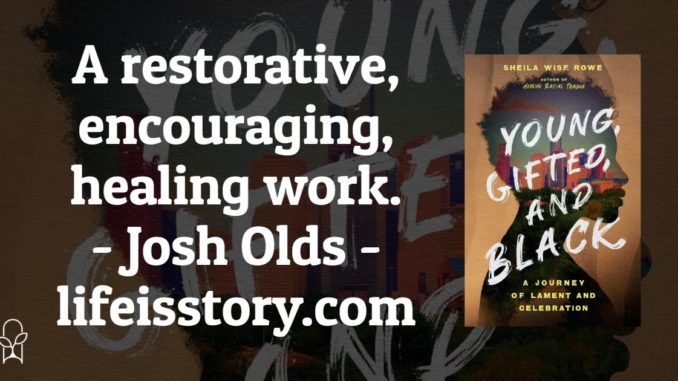
Also by this author: Healing Leadership Trauma: Finding Emotional Health and Helping Others Flourish
Published by IVP on March 1, 2022
Genres: Non-Fiction, Christian Life, Racial Reconciliation
Buy on Amazon
Goodreads

Young, gifted and black, Open your heart to what I mean . . . Nina Simone's popular anthem from the civil rights movement speaks to both the celebrations and trials of the Black experience. Young, Gifted, and Black gives voice to the real-life stories of Black teens and young adults. If life was a race, it's assumed that every runner has a fair shot at winning. However, it's not always the case for young, gifted, and Black folks. Sheila Wise Rowe goes beyond the common narrative that focuses solely on their struggles. Her stories point toward hope, joy, and healing. Drawing from her years of experience in counseling trauma and abuse survivors, Rowe provides stories, reflections, and tools for Black readers of all ages and their allies. In the telling of these stories, Rowe offers an opportunity to explore, reflect, and journey toward healing from the barriers that affect their lives, the lives of their children, and their communities.
“You are young, gifted and black” / We must begin to tell our young /
There’s a world waiting for you / Yours is the quest that’s just begun.
Nina Simone’s Civil Rights anthem To Be Young, Gifted, and Black debuted at the Harlem Cultural Festival in 1969. Over fifty years later, Sheila Wise Rowe picks up that anthem as the theme music of Young, Gifted, and Black: A Journey of Lament and Celebration. Rowe’s work highlights the challenges that Black people often face when striving for excellence—not just in the era of the Civil Rights Movement, but today in the twenty-first century. Writing for a Black audience, she speaks personally, honestly, and authentically about the need for healing and the necessity of lament. She shares the stories of Black millennials and young people, focusing on both the challenge and the overcoming, the celebration and the lament.
Young, Gifted, and Black is important because it expresses the Black experience in all its fulness and with nuance. It’s not all stories of lament and struggle, of beatings and discrimination. Nor is it all stories of overcoming, as if systemic imbalances are a thing of the past. It’s a real-life blend of both, authentically sharing stories in order that readers might reflect on and share their own.
Sheila Wise Rowe is an abuse and trauma counselor and her academic background positions her perfectly to tell these stories, offering hope and inspiration for so many others. As someone who is not Black, my impetus for reading was to be a better dad to my Black children and to better understand a cultural background I haven’t experienced. Perhaps the most helpful chapter for me was Fall in Line, an exploration of the expectation that Black children would conform to a certain rule or standard, particularly within majority White society.
Rowe offers readers the opportunity to, in many ways, sit in on her therapy sessions and just be present and learn from the stories that unfold. Every chapter ends with a series of reflections and an embodied prayer. By embodied prayer, I mean that Walsh offers more than just a prayer with words, but a prayer with actions. It’s a full-bodied way of connecting with God and connecting with oneself. These chapter endings add a lot to the text, helping readers process each chapter and find themselves in it.
Young, Gifted, and Black is a beautiful book that incisively but gently exists in the tension between lament and celebration, encouraging readers toward racial healing even as they encounter and break down the barriers that affect their flourishing. It’s a restorative, encouraging, healing work.
